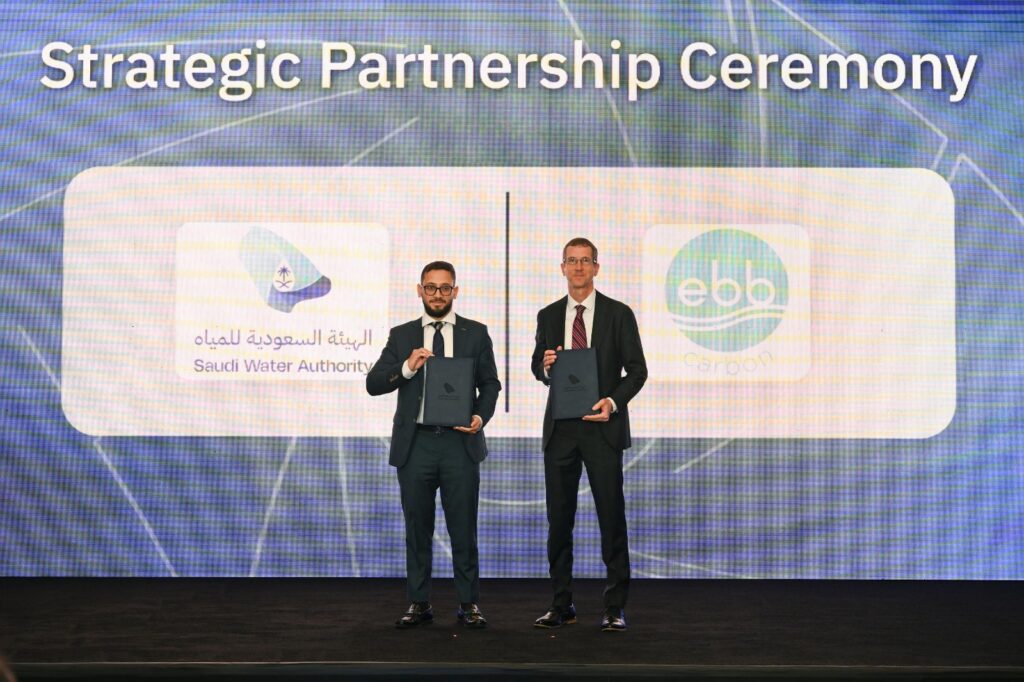Groundbreaking initiative captures carbon, boosts freshwater output, and converts desalination brine into valuable industrial resources.
Ebb, an industry-leading water innovation firm, has formed a major partnership with the Saudi Water Authority (SWA), the national body overseeing the Kingdom’s water sector, to deploy the world’s first large-scale desalination decarbonisation project. As Saudi Arabia represents 22% of global desalination capacity, the initiative is designed to deliver megaton-scale CO₂ removal in the next decade while enhancing water recovery and operational performance.
The partnership will integrate Ebb’s electrochemical technology into Saudi desalination assets, converting brine into valuable materials that strengthen sustainability and bolster national water resilience. The first implementation phase will be conducted at SWA’s advanced R&D facility in Jubail, The Water Technologies Innovation Institute and Research Advancements (WTIIRA), recognised globally for its leadership in next-generation desalination research.
As the world’s largest producer of desalinated water, Saudi Arabia is uniquely positioned to scale this technology across its national network. The project directly advances Vision 2030 by fostering environmental stewardship, nurturing economic diversification, and accelerating the deployment of breakthrough water technologies.
Ebb brings substantial expertise from multiple U.S.-based pilots, including long-term demonstrations in collaboration with the U.S. Department of Energy’s Pacific Northwest National Laboratory (PNNL) and Project Macoma.
Desalination remains central to Saudi Arabia’s water strategy, with national capacity projected to rise from 16 million to 17.8 million cubic metres per day by 2030. Traditionally, desalination brine has been considered an unwanted byproduct. Through this collaboration, SWA is turning brine into a strategic asset using an electrochemical process engineered for compatibility with existing desalination infrastructure.
Ebb’s system converts desalination brine into caustic soda, hydrochloric acid, and a low-salinity brine suitable for reuse in water production, enabling plants to extract additional freshwater. The acid and caustic soda can be used internally or supplied to key industrial sectors such as aluminium production and energy operations. Caustic soda can also be applied to increase seawater alkalinity, activating a natural pathway for long-term carbon removal. This approach supports Saudi Arabia’s ambition to build a circular, high-value industrial ecosystem while reducing waste.
By adopting Ebb’s technology, the Saudi Water Authority unlocks significant environmental benefits. SWA facilities have the potential to remove up to 85 megatons of CO₂ every year, supporting Vision 2030’s Net Zero pathway. The process also contributes to restoring marine conditions by reducing ocean acidity—an effect observed in scientific trials previously conducted in the United States.
“This partnership represents a transformative moment for both desalination and carbon removal. By integrating Ebb’s technology with SWA’s desalination infrastructure, we’re proving that addressing water scarcity and climate change aren’t competing priorities—they’re complementary solutions. SWA’s forward-thinking approach demonstrates how the desalination industry can unlock immense value and be a critical part of addressing some of the world’s most complex challenges profitably.” Ben Tarbell, Ebb’s CEO and Co-founder.
“This groundbreaking partnership demonstrates how Saudi Arabia is leveraging its position as the world’s largest desalinated water producer to create entirely new industries. The technology can be manufactured locally, creating jobs and reducing our reliance on imported chemicals, while our deployment establishes a model for the broader GCC region and water-scarce nations worldwide. We are not simply adopting technology – we are building a domestic carbon removal industry that supports government priorities’ economic diversification and positions the Kingdom as an exporter of climate solutions.” Tariq Alghaffari, SWA Vice President for Research & Promising Technologies.

